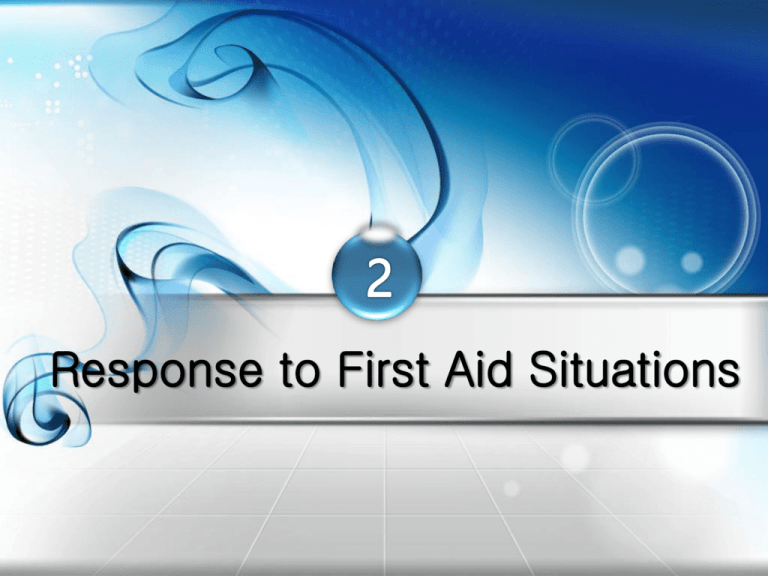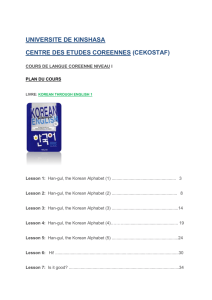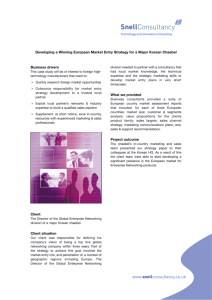Response to First Aid Situations
advertisement

Response to First Aid Situations Response to First Aid Situations Korean Red Cross Important Definitions Check: identifying the number of injured patients, ensuring on-site safet y of the patients, assessing the severity of the injuries and determining t he required manpower and resources. Call: quickly reporting the on-site status to EMS or 1-1-9. Care: Taking care of the injured patient until EMS arrives. Shock: critical condition when the organs and tissues of the body are no t receiving enough blood and oxygen; may result in major organ dysfun ction. Learning Objectives The steps you need to take during an emergency. What you need to be aware of on-site of the emergency. The measure you need to take if the injured person is in a dangerous situation. What you need to report to 119 about the situation. How to check the status and safety of the injured person. In case of shock, how to administer first aid. Response to First Aid Situations Korean Red Cross Check Call Care 1. CHECK Korean Red Cross ① Is it safe? ② What happened? ③ How many people are involved? ④ Is there immediate danger involved? ⑤ Is anyone else available to help? ⑥ What is wrong? 2. CALL Korean Red Cross Dial 1-1-9 Provide the information that the call taker requests. Do not hang up before the call taker does. You might cut off information the call taker needs. After you complete the call, continue to administer first aid. 2. CALL Korean Red Cross Important Information You Need to Tell the 119 Call Taker Name of the caller What happened? How many people are injured What is the current condition of the injured person? The location of where the emergency occurred 3. CARE Korean Red Cross Do no further harm. Help the person rest in the most comfortable position. Monitor the person’s breathing and consciousness. Keep the person from getting chilled or overheated Reassure the person. Give any specific care needed. Five Rules Of First Aid Korean Red Cross ① Ensure your safety. ② Your identity is revealed through your actions. ③ You do not make life or death judgments for the pati ent. ④ Generally, do not use medicine on the patient. ⑥ Know when to stop first aid and wait for professional medical personnel. Checking an ill or injured person Korean Red Cross Checking a Conscious Person - Interview the person and bystanders. - Check the person from head to toe. - What happened? - Do you feel pain or discomfort anywhere? - Do you have any allergies? - Do you have any medical conditions or are you taking any medication? Checking an ill or injured person Korean Red Cross Checking from Head to Toe ① Ask simple questions and keep interviews brief. ② Feel the skin with the back of your hand to determine its temperature. ③ Ask the person to gently move his or her head from side to side to check the neck. ④ Ask the person to shrug his or her shoulders to check the shoulders. ⑤ To check the chest and abdomen, ask the person to breathe deeply and then blow the air out. ⑥ Ask the person to move his or her fingers, hands and arms ⑦ Ask the person to bend his or her legs. ⑧ If there are no signals of obvious injuries, help the person into a comfortable position. ⑨ Help the person to slowly stand when he or she is ready. Checking an ill or injured person Korean Red Cross Checking an unconscious person ① Open the unconscious person’s airwa y using the head-tilt/ chin-lift technique. ② Look, listen and feel for movement a nd breathing for no more than 10 seconds. ③ Keep the airway open and give 2 resc ue breaths. ④ Check the severe bleeding by scannin g from heals to toe. Shock Korean Red Cross Causes of Shock The most common cause of shock is severe blood loss Signs of Shock Rapid, shallow Rapid and weak breathing pulse Severe thirst Pale, cold, cla mmy skin, swe ating Nausea and pos sibly vomiting Weakness and Unconsciou dizziness sness Caring for shock Korean Red Cross


